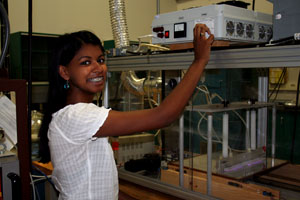Students take advantage of summer internship programs

Senior Amanda Weerasooriya works during the summer at Aberdeen Proving Grounds. Students are being offered summer internship programs through the Science and Engineering Apprenticeship Program (SEAP).
Summer is a three month vacation and a time of relaxation for busy students. However, some students choose to spend their summers a little differently.
Instead of spending her summer at the beach or the pool, junior Morgan Jones wants to participate in an internship provided by the Science and Engineering Apprenticeship Program (SEAP). On Tuesday, Dec. 13, Jones attended an informational meeting given by science department chair Rebecca Jansing-Kaestner.
“I’m really passionate about science and I want to be a glaciologist and I hope this internship will help me achieve that goal,” Jones said.
During the meeting, Jansing-Kaestner showed the students the SEAP on-line application.
“We talked about what to put in the application and how to answer the essay questions. I also talked to them about doing a resume so that I can get it to the internship coordinator,” Jansing-Kaestner said.
The SEAP program provides an opportunity for students to participate in research at a Department of Navy (DoN) laboratory over the summer. The goals stated on the official SEAP website are “to encourage participating students to pursue science and engineering careers, to further their education via mentoring by laboratory personnel and their participation in research, and to make them aware of DoN research and technology efforts.”
Students who participate in the program spend eight weeks during the summer doing research, with scientists and engineers who act as their mentors. Senior Jon Galarraga took advantage of this opportunity last summer when he, and other current students, such as seniors Heather Kirwan and Jenny Yang, worked at Aberdeen Proving Ground (APG).
“[My experience] was amazing. It really expanded my horizons. I got to see different engineers to collaborate on a project, and it solidified my career aspirations,” Galarraga said.
Alumni who have been a part of the internships at APG in the past have taken their experience and used it to create more opportunities for themselves. Stanley Strawbridge ‘07 went on to study chemical engineering at West Virginia University, and received more internship opportunities when he was in college. Megan Kazanski, class of ’11, presented her research to an international symposium.
Jansing-Kaestner has acknowledged that those students who work through the SEAP program gain a definite advantage when it comes to college and their careers.
“It shows colleges and businesses that you are serious about your decision to study science. It could be a defining moment for you as a student, solidifying your commitment,” Jansing-Kaestner said.
”I’m looking forward to the experience and being able to gain knowledge,” Jones said.
Miranda Ripken is a Sports Editor for The Patriot and jcpatriot.org.


